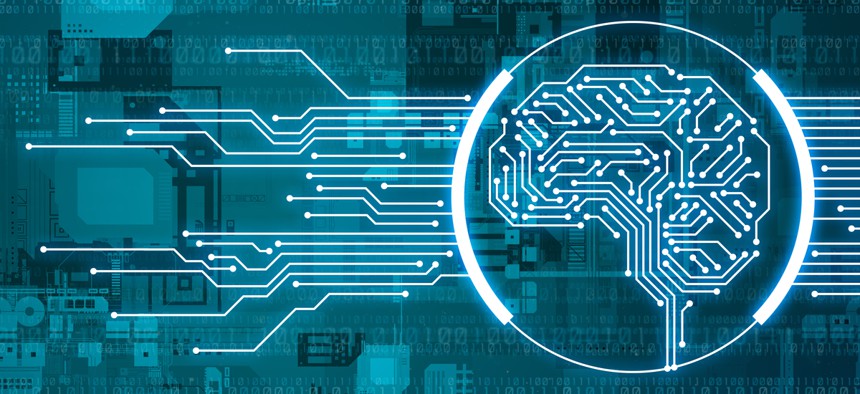GSA Teams With Pentagon AI Shop for Centers of Excellence Program

metamorworks/Shutterstock.com
The partnership will focus on streamlining the Joint Artificial Intelligence Center’s internal operations and speeding up the contracting process, according to Lt. Gen. Jack Shanahan.
The General Services Administration is partnering with the Defense Department to expand the Pentagon’s use of artificial intelligence and spur broader adoption of the tech across the government.
GSA on Wednesday announced the Pentagon’s Joint Artificial Intelligence Center will be the next organization to participate in the Centers of Excellence program, a White House initiative that’s intends to modernize the government’s tech infrastructure. While previous iterations of the program focused largely on pulling outdated federal systems out of the past, under the most recent partnership, officials are looking to push the department's tech ecosystem into the future.
Created to manage the Pentagon’s various artificial intelligence efforts, the JAIC has spent most of its first year getting operations off the ground. But as the group prepares to debut its initial capabilities, officials want to ensure it has a sustainable operating model for the years ahead.
Through the Centers of Excellence program, the JAIC will work with GSA to speed up its development of AI technologies and deploy those tools more broadly adopted across the Pentagon.
Specifically, officials will lean on GSA to accelerate the contracting and acquisition process, which has historically slowed the department’s adoption of emerging tech, and streamline other time-consuming internal operations, according to Lt. Gen. Jack Shanahan, who leads the JAIC. The agency also plans to assist the center in deploying automation tools and standing up the Joint Common Foundation, the digital platform where JAIC researchers will build and test new AI capabilities, he said.
“[GSA has] been very forward in coming to us and saying, ‘We know what you’re going through, we know what you’re trying to do,’” Shanahan said Wednesday during a panel at the Kalaris Intelligence Conference. “They’ve offered to help us pretty much in every single line of effort.”
Looking beyond the Pentagon, the partnership between GSA and the JAIC could also help other federal agencies reap the benefits of artificial intelligence, according to Anil Cheriyan, director of GSA’s Technology Transformation Services. The administration is looking to stand up a new center of excellence around artificial intelligence, he said, and working with the JAIC will help officials lay the groundwork for those future efforts.
“We believe that the opportunities for applying AI in government are significant,” Cheriyan said in a statement. “We’re proud to be seizing the opportunity with our newest partner, enabling AI to bolster the capabilities of today’s warfighter, and build a foundation to reuse our AI expertise to improve citizen experiences across government.”
The Pentagon is the fifth agency selected to participate in the Centers of Excellence program, following the Agriculture Department, Housing and Urban Development Department, Office of Personnel Management and U.S. Consumer Product Safety Commission. Earlier iterations of the program focused on five areas of technology improvements—client experience, call centers, IT modernization, cloud and analytics—but in an April interview, Cheriyan said GSA is looking to expand the scope of the program.
While the program will help the JAIC streamline its internal operations and build partnerships with industry, the center still has other obstacles to overcome, Shanahan said during the panel. Officials are having a hard time bringing on technical experts to develop new AI capabilities, and even once those tools are built, getting the Pentagon to adopt them more broadly will be a challenge, he said.
Recently, Shanahan and other Pentagon officials have stressed the importance of enterprise cloud services to the department’s adoption of artificial intelligence and other emerging technologies. The department’s Joint Enterprise Defense Infrastructure contract has been held up in a legal battle for months, though the $10 billion contract is expected to be awarded in the near future.
Getting the Pentagon to embrace AI will also require officials to do away with longstanding approaches to procurement and innovation, he said, and those cultural changes are difficult to bring about.
“We’re trying to build a startup culture, a startup organization, as part of the institutional bureaucracy. That’s not easy to do,” Shanahan said. “If I’m going to get funding for the next five years, I have to learn to speak the language of the institution. But on the other hand, to really embrace AI … we have to get that startup culture. It’s a fine balance, and sometimes it’s hard to get it right.”






